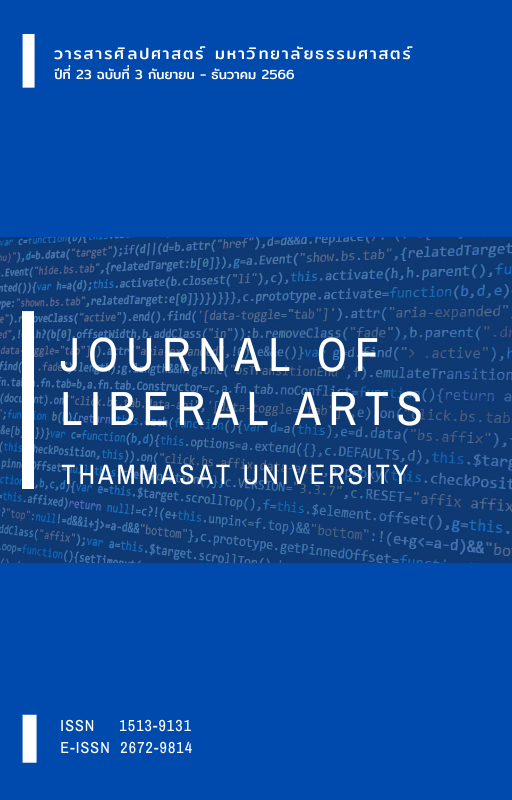Political Idol of the New Generation
Main Article Content
Abstract
This research article aims to understand politically active young people under a new structure of feeling, examining what do they want a political role model or “political idol” to be and do? This research uses a qualitative methodology with a random sampling group of key informants composed of in-depth interviews and focus group discussions with 61 informants in a province in the upper northern region. The findings revealed that the current generation's emotional attitude is hopeful and requires forward-thinking leaders to solve the country’s problems as well as understanding people’s problems. It is different from the previous generation. While the older generation is worried about the state power that represses the opinions of the new generation, political role models or political idols that the new generation needs should demonstrate these features: 1) be a leader able to create hope and positive energy in politics; 2) be a change agent; and 3) understand problems and come up with concrete proposals. In addition, it is necessary to have knowledge and ability including listening to people who have different opinions and being able to influence ideas in a wide area.
Downloads
Article Details

This work is licensed under a Creative Commons Attribution-NonCommercial-NoDerivatives 4.0 International License.
References
เกษียร เตชะพีระ. (2564). การเมืองวัฒนธรรม วิเคราะห์ประเมินม็อบราษฎรเยาวรุ่น. มติชนสุดสัปดาห์. https://www.matichonweekly.com/column/article_355246
กนกรัตน์ เลิศชูสกุล. (2564). สงครามเย็น(ใน) ระหว่าง โบว์ขาว. มติชน.
คณะราษฎร 2563: แฟนคลับศิลปินเกาหลีผนึกกำลังขับเคลื่อนการประท้วงของเยาวชนไทย. (5 พฤศจิกายน 2563). BBC News ไทย. https://www.bbc.com/thai/international-54794129
จงจิตต์ ฤทธิรงค์, เฉลิมพล แจ่มจันทร์, พิมลพรรณ นิตย์นรา, และ ณัฐณิชา ลอยฟ้า. (2565). คนวัยแรงงานคาดหวังและเตรียมตัวอย่างไรเพื่อชีวิตในวัยสูงอายุ. มหาวิทยาลัยมหิดล, สถาบันวิจัยประชากรและสังคม.
จันจิรา สมบัติพูนศิริ. (2558). หัวร่อต่ออำนาจ อารมณ์ขันและการประท้วงด้วยสันติวิธี. มติชน.
ไชยรัตน์ เจริญสินโอฬาร.(2563). สังคมศาสตร์ทางเลือก. วิภาษา.
ณัฐพล ใจจริง. (2565). ราษฎรปฏิวัติ. มติชน.
เทวฤทธิ์ มณีฉาย. (2564). ชาวทวิตเตอร์เริ่มเขย่าการเมืองได้อย่างไร? พลัง “ติ่งเกาหลี” น่ากลัวแค่ไหน?. ประชาไท. https://prachatai.com/journal/2021/01/91178
ธนาธร จึงรุ่งเรืองกิจ. (2565). คิดไปข้างหน้า. มูลนิธิคณะก้าวหน้า.
นพพล อาชามาส. (2559). มาตรา 112 การเมืองของความกลัวและการสร้างความหวาดหวั่นโดยรัฐและสังคม: กรณีศึกษาก่อนรัฐประหาร 22 พฤษภาคม 2557. ฟ้าเดียวกัน, 14(1), 85-114.
บอยด์ ดานาห์. (2561). เข้าใจโลกใหม่ของวัยรุ่นวุ่นเน็ต. บุ๊คสเคป.
บุศรินทร์ แปแนะ, อานนท์ ชวาลาวัณย์, ณัชปกร นามเมือง, ยิ่งชีพ อัชฌานนท์, ธนพร กีรติสมิต, และ เฝาซี ล่าเต๊ะ. (2561). เมื่อถึงเวลาดอกไม้จะบาน. Mob Data Thailand.
ปิยะบุตร แสงกนกกุล. (2562). การเมืองแห่งความหวัง. ภาพพิมพ์.
พริษฐ์ วัชรสินธุ์. (2565). ประชาธิปไตยไม่ใช่ฝัน. ลูป.
พวงทอง ภวัครพันธุ์. (2555). เสียงจากเหยื่อ “ความจริงเพื่อความยุติธรรม”. ใน ชัยธวัช ตุลาธน (บรรณาธิการ), ความจริงเพื่อความยุติธรรม: เหตุการณ์และผลกระทบจากการสลายการชุมนุม เมษา-พฤษภา 53 (พิมพ์ครั้งที่ 2, หน้า 10-23). ศูนย์ข้อมูลประชาชนผู้ได้รับผลกระทบจากการสลายการชุมนุมกรณี เม.ย.-พ.ค. 53 (ศปช.).
พิธา ลิ้มเจริญรัตน์. (2564). วิถีก้าวไกล. ภาพพิมพ์.
โพลนิสิตจุฬา 1,266 ตัวอย่าง “อนาคตใหม่” ครองใจ อยากได้ “ธนาธร-ชัชชาติ” เป็นนายก.(2562). ประชาชาติธุรกิจ. https://www.prachachat.net/politics/news-302289
ยุกติ มุกดาวิจิตร. (2564). วิวาทะมานุษยวิทยา: วิถีทฤษฎีและวิธีวิทยา. สยามปริทัศน์
รังสิมันต์ โรม. (2564). เรียนประชาชนที่เคารพ. ภาพพิมพ์.
เลือกตั้ง 2562: เช็กชื่อ 51.4 ล้านคนตรวจสิทธิเลือกตั้ง. (1 มีนาคม 2562). Thai PBS. https://www.thaipbs.or.th/news/content/278084
ศิวัช ศรีโภคางกุล. (2562). ปีศาจวิทยากับสังคมการเมืองไทนร่วมสมัย. ใน จันจิรา สมบัติพูนศิริ และ ประจักษ์ ก้องกีรติ (บรรณาธิการ), ระหว่างปริศนาและศรัทธา: ชัยวัฒน์ สถาอานันท์ กับการเมืองมนุษย์ในศตวรรษ ที่ 21 (หน้า 219-248). สยามปฏิวัติ.
ส่องแฮชแท็ก “ฟ้ารักพ่อ” มาจากไหน ทำไมต้องเป็น “ธนาธร”. (2562). ผู้จัดการออนไลน์. https://mgronline.com/onlinesection/detail/9620000014262
อรรถสิทธิ์ พานแก้ว และ ชุติเดช เมธีชุติกุล (2564). “OK Bloomer”: เสียงสะท้อนจากเยาวชนไทย จากคูหาสู่การเคลื่อนไหว. รัฐศาสตร์สาร, 42(2), 37-68.
อัมพร จิรัฐติกร. (2563). รสนิยมและแฟนคลับละครไทยในอาเซียนและจีน: การตลาดและการเมืองเรื่องอารมณ์ในโลกออนไลน์. มหาวิทยาลัยเชียงใหม่.
Andersen, K., Jakob. O., Bjarnoe C., Bordacconi M., Albaek E., & Vreese. C. (2020). Generational gaps in political media use and civic engagement from baby boomer to generation z. Routledge. https://doi.org/10.4324/9781003111498
Andini, A. N., & Akhni, G. N. (2021). Exploring youth political participation: K-Pop fan activism in Indonesia and Thailand. Global Focus, 1(1), 38-55.
Boler, M., & Davis, E. (2018). The affective politics of the “Post- truth” era: Feeling rules and networks subjectivity. Emotions, Space, and society, 27, 75-85.
buubae. (19 กรกฎาคม 2564). ไอดอลเพื่อชีวิต รวมวาทะจากไอดอลผู้คอลเอาท์เพื่ออนาคต. Mangozero. https://www.mangozero.com/idol-callout/
CANDYCLOVER. (16 เมษายน 2560). กระแส K-Pop ที่กำลังมีบทบาทจะก้าวข้ามวัฒนธรรมได้หรือไม่? พบกับ BTS และซีอีโอ ‘Hotman’ BANG จากสังกัด Big Hit ผู้กุมอเมริกา. https://candyclover.com/กระแส-k-pop-bts/
Cho, A., Byrne, J., & Pelter, Z. (2020). Digital civic engagement by young people. UNICIEF. https://www.unicef.org/globalinsight/reports/digital-civic-engagement-young-people
Dean, J. (2017). Politicizing fandom. The British Journal of Politic1s and International Relations, 19(2), 408-424.
Ganjakhundee, S. (2020). Youthquake evokes the 1932 revolution and shakes Thailand’s establishment. ISEAS Perspective, 2020(127), 1-9.
Goodwin, J., Jasper, J. M., & Polletta, F. (2001). Passionate Politics. The University of Chicago Press.
Harnphattananusorn, S., & Puttitanun, T. (2021). Generation gap and its impact on economic growth. Heliyon, 7(6). https://doi.org/10.1016/j.heliyon.2021.e07160
iLaw. (29 มกราคม 2564). In numbers: การชุมนุม 2563 [Image attached] [Status update]. Facebook. https://www.facebook.com/iLawClub/photos/a.10153394320770551/10164986648340551/?type=3
iLaw. (19 พฤษภาคม 2565). การชุมนุมปี 2563 พริบตาแห่งความเปลี่ยนแปลง: พลังก่อตัวจากไหน พัฒนาการอย่างไร เราเจออะไรมาบ้าง. https://freedom.ilaw.or.th/node/1059
Lertchoosakul, K. (2021). The white ribbon movement: High school students in the 2020 Thai youth protests. Critical Asian Studies, 53(2), 206-218. https://doi.org/10.1080/14672715.2021.1883452
Lünenborg, M., & Maier, T. (2018). The turn to affect and emotion in media studies. Media and Cummunication, 6(3), 1-4. https://doi.org/10.17645/mac.v6i3.1732
Henn M., Weinstein, M., & Dominic, W. (2002). Generation apart? Youth and political participation in British. British Journal of Politics and International Relations, 4(2), 167-192. https://doi.org/10.1111/1467-856X.t01-1-00001
McCargo, D. (2021). Disruptors’ dilemma? Thailand’s 2020 Gen Z protests. Critical Asian Studies, 53(2), 175-191. https://doi.org/10.1080/14672715.2021.1876522
Phoborisut, P. (2020). The 2020 Student Uprising in Thailand: A Dynamic Network of Dissent. ISEAS Perspective, 2020(129), 1-10.
Rachmawati, I. (2022). The magic of Kim Namjoon as a leader of BTS in conquering the American market. RUBIKON: Journal of Transnational American Studies, 9(2), 230-243. https://doi.org/10.22146/rubikon.v9i2.75588
Sinpeng, A. (2021). Hashtag activism: Social media and the #FreeYouth protest in Thailand. Critical Asian Studies, 53(2), 192-205. https://doi.org/10.1080/14672715.2021.1882866
Sloam, J., & Henn, M. (2018). Youthquake 2017. Palgrave Studies in Young People and Politics book series (PSYPP). https://link.springer.com/chapter/10.1007/978-3-319-97469-9_2
Talmon, G. (2019). Generation Z: What’s next?. Medical Science Educator, 29(suppl 1), 9-11. https://doi.org/10.1007/s40670-019-00796-0
Thomas, E., Beattie, T., & Zhang, A. (2020). #WhatHappeninginThailand: The power dynamics of Thailand’s digital activism. Australian Strategic Policy (ASPI). https://www.aspi.org.au/report/whatshappeninginthailand-power-dynamics-thailands-digital-activism
Waiwitlikhit, P. (2020). The Next Generation? a comparison between Thailand’s 1973 protests and Thailand’s 2020 protests. International Journal of Humanities and Social Science, 20(12), 16-25.
Williams, R. (1961). The long revolution. Chatto & Windus.
Williams, R. (1989). Resources of hope: Culture, democracy, socialism. Verso Books.
Zwaan K., & Brain J. (2012). Adapting idols: Authenticity, identity and performance in the global television. Routledge.


